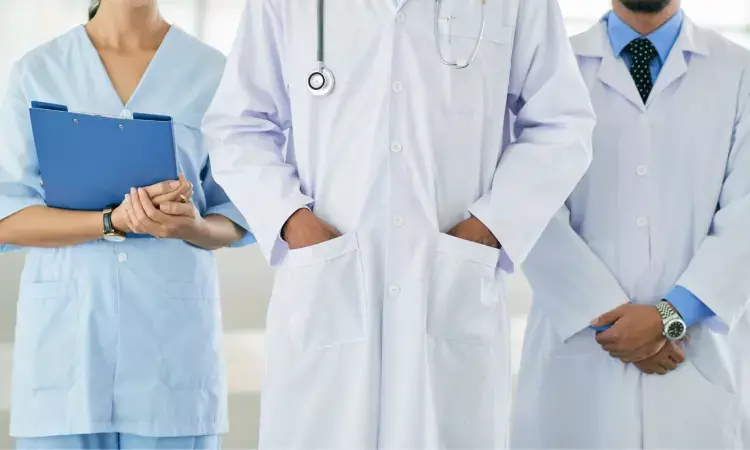- Home
- Medical news & Guidelines
- Anesthesiology
- Cardiology and CTVS
- Critical Care
- Dentistry
- Dermatology
- Diabetes and Endocrinology
- ENT
- Gastroenterology
- Medicine
- Nephrology
- Neurology
- Obstretics-Gynaecology
- Oncology
- Ophthalmology
- Orthopaedics
- Pediatrics-Neonatology
- Psychiatry
- Pulmonology
- Radiology
- Surgery
- Urology
- Laboratory Medicine
- Diet
- Nursing
- Paramedical
- Physiotherapy
- Health news
- Fact Check
- Bone Health Fact Check
- Brain Health Fact Check
- Cancer Related Fact Check
- Child Care Fact Check
- Dental and oral health fact check
- Diabetes and metabolic health fact check
- Diet and Nutrition Fact Check
- Eye and ENT Care Fact Check
- Fitness fact check
- Gut health fact check
- Heart health fact check
- Kidney health fact check
- Medical education fact check
- Men's health fact check
- Respiratory fact check
- Skin and hair care fact check
- Vaccine and Immunization fact check
- Women's health fact check
- AYUSH
- State News
- Andaman and Nicobar Islands
- Andhra Pradesh
- Arunachal Pradesh
- Assam
- Bihar
- Chandigarh
- Chattisgarh
- Dadra and Nagar Haveli
- Daman and Diu
- Delhi
- Goa
- Gujarat
- Haryana
- Himachal Pradesh
- Jammu & Kashmir
- Jharkhand
- Karnataka
- Kerala
- Ladakh
- Lakshadweep
- Madhya Pradesh
- Maharashtra
- Manipur
- Meghalaya
- Mizoram
- Nagaland
- Odisha
- Puducherry
- Punjab
- Rajasthan
- Sikkim
- Tamil Nadu
- Telangana
- Tripura
- Uttar Pradesh
- Uttrakhand
- West Bengal
- Medical Education
- Industry
Gujarat Hikes Honorarium: Rs 4,200 for Visiting Specialists, Rs 8,500 for Super-Specialists

Doctors
Ahmedabad: In a big move to improve healthcare services across the state, the Gujarat government has increased the honorarium for private visiting specialists and super-specialist doctors serving at the district hospitals, sub-district hospitals and community health centres under the Chief Minister’s Setu Scheme.
As per the new revised pay scale, visiting doctors across various categories will now receive higher daily or monthly payments for their services in government hospitals.
Now, non-surgical super-specialists and surgical super-specialists will be paid equally of Rs 8,500 per day for at least three hours of mandatory service at government hospitals. Similarly, all categories of private visiting specialist doctors will now be paid Rs 4,200 per day for three hours of service.
Also read- NHM offers Incentives, Honorariums to encourage doctors to practice in Rural Areas: MoS Health
The revised pay structure is expected to encourage more specialists to work in government hospitals and improve access to quality healthcare for patients, especially in rural and underserved areas.
Previously, paediatricians and general physicians were given an honorarium of Rs 3,000 per day, and an amount of Rs 2,000 per day was allotted for other specialist doctors. However, they will now be paid a uniform pay of Rs 4,200 per day.
Changes have also been made in the payment structure for super-specialist doctors working in hospitals affiliated to government medical colleges, and Gujarat Medical Education and Research Society (GMERS)-run medical colleges of the state, as reported by Ahmedabad Mirror. Previously, non-surgical super-specialists received Rs 8,500 per day, whereas surgical super-specialists were paid only Rs 2,700. Now, under the revised policy, both categories will uniformly receive Rs 8,500 per day for at least three hours of service.
Health Minister Rushikesh Patel made the announcement during a state cabinet meeting held yesterday, which was chaired by Chief Minister Bhupendra Patel.
Alongside this, the state has also increased the financial powers of medical officers and purchase committees at the levels of Primary Health Centres (PHCs) to medical colleges.
Under the revised rules, Medical Officers of PHCs and DTTs can now approve purchases up to Rs 50,000. CHCs can spend up to Rs 1 lakh, an increase from the earlier Rs 20,000 limit. District and sub-district hospitals (DH/SDH) can now approve expenses up to Rs 2 lakh, compared to the previous Rs 25,000 limit. Medical colleges have been allowed to spend up to Rs 5 lakh, up from Rs 2 lakh. These expenses cover essential items like medicines, lab kits, x-ray materials, medical equipment, and emergency medical needs.
Also read- WB Govt hikes honorarium, terminal benefits of municipal healthcare workers
MA in Journalism and Mass Communication
Exploring and learning something new has always been her motto. Adity is currently working as a correspondent and joined Medical Dialogues in 2022. She completed her Bachelor’s degree in Journalism and Mass Communication from Calcutta University, West Bengal, in 2021 and her Master's in the same subject in 2025. She mainly covers the latest health news, doctors' news, hospital and medical college news. She can be contacted at editorial@medicaldialogues.in


